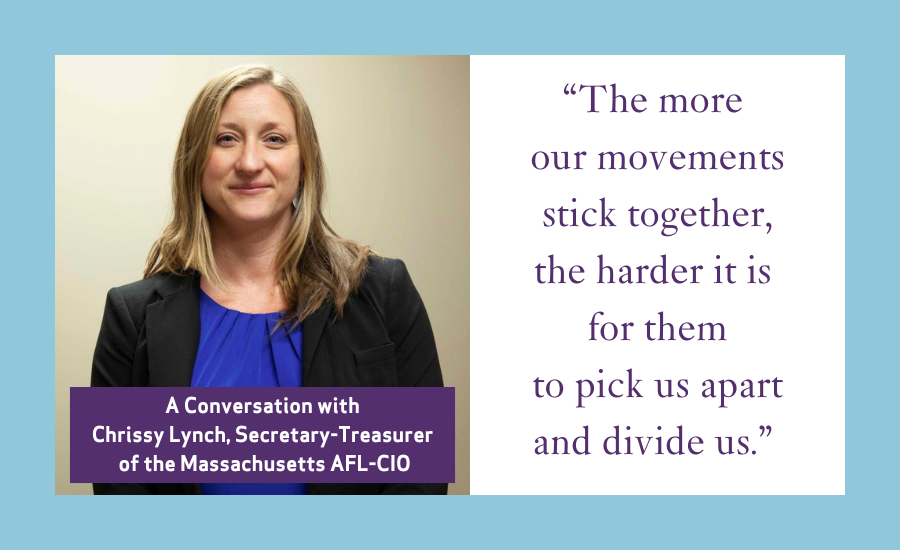
“The more our movements stick together, the harder it is for them to pick us apart and divide us.” - A Conversation with Chrissy Lynch, Secretary-Treasurer of the Massachusetts AFL-CIO
Massachusetts labor is hard at work building the green economy - retrofitting old buildings to make them more energy efficient, upgrading our aging power grid, and building offshore wind infrastructure.
The labor and environmental movements are organizing together to ensure that this work is not only building a cleaner future, but also building economic opportunity in the form of good, union jobs.
Chrissy Lynch, the Secretary-Treasurer and Chief of Staff of the Massachusetts AFL-CIO, is one of the labor leaders working to build pathways to union work for underrepresented groups and fighting for labor standards so that there are plenty of unionized jobs for everyone in the green economy.
Thank you so much for taking the time to speak with us today. How did you first get involved in labor organizing, and what motivated you?
I’ve always felt a passion to do something I believe in, and I found labor. I had a lot of jobs in high school and in college - barista, bartending, retail - where I could see that something wasn’t working for workers. I didn’t know how to articulate it at the time, but I felt it. When I graduated college, I got involved with campaigns for Democrats that had very strong labor backing, focusing on an economic justice lens, and I fell in love with it. I thought to myself: This is the movement I’ve been looking for.
What campaign was your first collaboration with Clean Water Action?
I was first introduced to [Clean Water Action New England director] Cindy Luppi by Darlene Lombos, from Community Labor United, an organization created to identify shared values between the labor and environmental movements. She told me, “Cindy is somebody who gets us.”
Our first real campaign together was working with firefighters to ban certain chemicals from things like car seats and the gear firefighters wear to protect both children and first responders. It was really nice to see firefighters and labor working with environmental advocates to identify shared goals and build campaigns around them and to reject the false choice that industry likes to put on us that you can’t have good jobs and a clean environment. The more our movements stick together, the harder it is for them to pick us apart and divide us.
A key part of Clean Water’s offshore wind campaigning has been making sure there are high quality job opportunities for members of the communities that have borne the brunt of industry pollution. We know that the AFL-CIO is focused on creating pathways for groups that have been historically underrepresented, like women and BIPOC workers. Can you share more details about that work?
It really starts and ends with intentionality. We need to make sure that women, people of color, people who have been bearing the brunt of pollution and climate change, and also people who historically haven’t had access to the family-sustaining careers in the unionized building trades have access to these jobs. Building Pathways was created to make sure that they do. Apprenticeships in the building trades are really competitive. Our pre-apprenticeship model is giving people a leg up, and now it’s something that we have replicated across Massachusetts. Hopefully, we will see other states start to catch up.
On the policy side, we are pushing to make sure there are strong labor standards in all green jobs. We need strong public policy to make sure these jobs are good, union jobs and that there are strong labor standards in the entire supply chain including manufacturing and operations. It’s not going to happen unless we are really pushing for it.
Additionally, to get more women into these careers that have historically been done by men, we need to think about the needs of women including access to childcare, access to reproductive care, respect on the job, and good wages and benefits. We are involved with fighting for a more accessible, equitable, and better childcare system. Childcare has proven to be a real barrier to entry and retention for women in building trades. When you’re expected to be at a job site before 6:30am, when most daycares aren’t even open, that’s a real barrier.
Then, we’re making sure that people are not only brought onto the job site but respected. It’s about creating spaces for women to talk with other women about how they can have each other’s backs. In Boston, for example, a lot of women in the trades have created Boston Union Trade Sisters, a facebook group where they host events and create meetups.
I have a young daughter. Why should parents encourage their daughters to build our nation’s clean energy infrastructure?
We need to show that women can do any job that a man can do. One of the beautiful things about unions is that there is no gender pay gap. In collective bargaining agreements, if men and women are doing the same job, they make the same money. That’s why we’ve got to get more women into unions, AND we need to create more union jobs by requiring labor standards through public policy in this new clean energy economy.
Some people refer to a so-called “worker shortage.” There are plenty of workers. What there is a shortage of is jobs that pay a fair wage that make it worth the cost of childcare and the cost of transportation to go to work. We can fight climate change, we can grow the middle class, and we can fight gender and racial inequality at the same time, but we can only do these things if public policy requires strong labor standards on clean energy projects.


